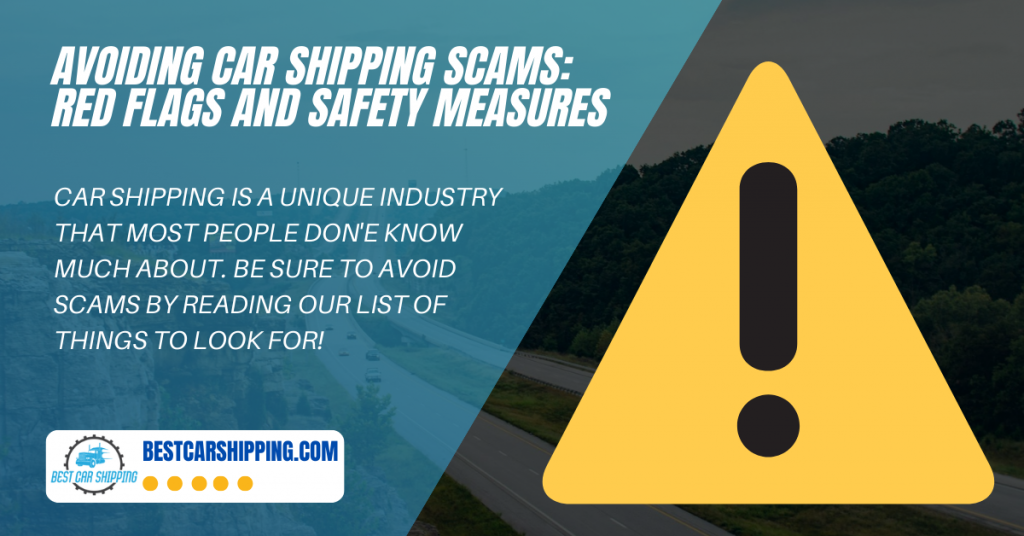When it comes to transporting your vehicle, it’s essential to choose a reliable and trustworthy car shipping company. Unfortunately, the auto transport industry is not immune to scams and fraudulent activities. To protect yourself and your vehicle, it’s crucial to be aware of the red flags and take necessary safety measures. In this blog, we’ll explore common car shipping scams, identify warning signs, and provide valuable tips to avoid falling victim to these scams.
Red Flags and Safety Measures at a Glance
| Red Flag | Safety Measure |
|---|---|
| Unrealistically low quotes | Compare quotes from multiple reputable companies and look for prices that are within a reasonable range. |
| Hidden broker fees | Ensure that the car shipping company discloses their broker fees upfront and provides a clear breakdown of costs. |
| Lack of pricing transparency | Ask the car shipping company what would happen if they can't find a carrier at the quoted price. |
| Deposit scams | Opt for reputable brokers who do not charge a fee until dispatch and carrier companies that don't collect payment until a successful delivery. |
| Reviews | Read online reviews before booking a transport company to gather insights from real customers. |
| Aggressive brokers | Trust your instincts and be cautious if a broker's behavior comes across as overly desperate. |
| Unknown drivers | Never hand over your keys to a driver unless the broker provides you with the carrier's company name and contact information. |
| Refusal to verify credentials and insurance | Verify with your auto transport broker that your assigned carrier company meets all regulatory requirements and is fully insured. |
Bait-and-Switch Tactics: Spotting Unrealistically Low Quotes
One of the most prevalent car shipping scams is the bait-and-switch tactic. Scammers lure unsuspecting customers in with incredibly low quotes, only to reveal that the actual price is much higher after the initial agreement. This leaves the customer with no choice but to pay the inflated price or risk losing their vehicle.
To avoid falling for this scam, it’s essential to be cautious of quotes that seem too good to be true. Compare quotes from multiple reputable companies and look for prices that are within a reasonable range. If a quote stands out as significantly lower than the others, it’s a red flag that you may be dealing with a scammer.
Hidden Broker Fees: A Sign of a Potential Scam
A reputable car shipping company will always disclose their broker fees upfront. Brokers play a crucial role in the auto transport process and charge a fee for their services. If a company refuses to disclose their broker fee or claims that they don’t charge one, it’s a red flag. Such companies may engage in unethical practices, such as lowballing carriers, which can result in delays or other complications.
When considering a car shipping company, ensure that they are transparent about their fees and provide you with all the necessary information regarding the breakdown of costs. Ask for a detailed breakdown of all costs, including broker fees, carrier charges, and any additional surcharges. Be wary of companies that are evasive or reluctant to provide clear pricing information.
Pricing Transparency: Beware of Dodging Questions
Another red flag to watch out for is a lack of pricing transparency. Legitimate car shipping companies should be able to provide straightforward answers to specific pricing questions. If a company avoids answering questions about potential price increases or fails to provide a clear explanation of their pricing structure, it’s a clear sign that they may be involved in a scam.
When communicating with a potential auto transport company, ask them what would happen if they can’t find a carrier at the quoted price. If the broker claims that such situations never occur, it’s a strong indication that they are not a legitimate company.
In addition to the base carrier rate, car shipping companies may charge various fees and surcharges. These may include fuel surcharges, terminal fees, insurance fees, and storage fees. Fuel surcharges are often adjusted based on fluctuating fuel prices, while terminal fees cover the cost of loading and unloading vehicles at shipping terminals. Insurance fees protect the vehicle and the carrier in case of damage or loss, and storage fees apply if the vehicle is held at a terminal for an extended period.
Deposit Scams: Avoiding Non-Refundable Fees
Car shipping scams often involve demanding non-refundable deposits from customers. Legitimate auto transport companies collect their fees only after the vehicle has been successfully dispatched. If a company insists on a deposit upfront or requests payment through untraceable methods like wire transfers, it’s a clear warning sign.
Deposits are often hundreds of dollars. Falling victim to a deposit scam puts you in a difficult position, where you have to decide whether to lose the deposit and start over with another company or accept the new, inflated price.
To protect yourself, opt for reputable brokers who do not charge a fee until dispatch and carrier companies that don’t collect payment until a successful delivery.
Negative Reviews: A Warning Sign
Customer reviews are an excellent resource for identifying potential car shipping scams. If you come across reviews that mention scams or fraudulent activities, it’s best to steer clear of the company in question. Look for companies with an average review rating that meets or exceeds the industry average of 4.6 out of 5 stars. Positive reviews mentioning low prices, excellent customer service, and professional drivers are also indicators of a reputable company.
To gather insights from real customers, take the time to read online reviews before booking a transport company. The experiences shared by others can give you a quick sense of whether the company is reputable or not.
Aggressive Brokers: A Sense of Urgency
Be cautious of car shipping brokers who appear desperate for your business. While it’s natural for brokers to reach out and follow up, an excessive amount of communication can be a warning sign. If a broker constantly bombards you with texts, calls, and emails, it may indicate that they are not busy transporting cars for other customers. A legitimate and reputable broker will strike a balance between attentive customer service and professionalism.
Trust your instincts and be cautious if a broker’s behavior comes across as overly desperate. It’s advisable to seek out another transport company that maintains a more balanced and professional approach.
Unknown Drivers
If you receive a call from a random driver claiming to be picking up your vehicle, exercise caution. Never hand over your keys to a driver unless the broker provides you with the carrier’s company name and contact information. Random carriers may charge exorbitant fees or, in the worst-case scenario, steal your car.
Similarly, be cautious of brokers who fail to provide the necessary information about the trucking company. If a broker delays sharing the carrier’s name or phone number and later claims that the carrier’s truck broke down, leading to further delays, it’s a sign of potential scamming.
To avoid falling victim to these scams, always ask the broker for the carrier’s information and never hand over your vehicle to a driver who contacts you randomly
Navigating Disputes and Protecting Your Rights
Despite taking precautionary measures, there may be instances where you encounter issues with a car shipping company. It’s important to be aware of your rights as a consumer and the options available to you for resolving disputes.
Understanding Your Consumer Rights
As a consumer, you have certain rights when it comes to car shipping services. These rights include:
- Right to Accurate Information: You have the right to receive accurate and transparent information about the car shipping process, including potential fees, surcharges, and delivery timelines.
- Right to Up-to-date Information: Your vehicle should be transported safely and securely, and you should be notified of any delays or potential damage.
- Right to Timely Delivery: The car shipping company should adhere to the agreed-upon delivery schedule.
- Right to File a Complaint: You have the right to file a complaint with the appropriate authorities if you encounter any problems with the car shipping service that are not acceptable under the contract you have with the carrier
Resolving Disputes with the Car Shipping Company
If you experience delays, damage to your vehicle, or any other problems with the car shipping service, first attempt to resolve the issue directly with the company. Communicate your concerns clearly and provide any supporting documentation, such as photos or emails.
If you are unable to reach a satisfactory resolution with the company, consider the following options:
- Connect with your broker. Many times the broker you have worked with will be able to help you resolve any issues you may experience with the car carrier. Make sure to make reaching out to them one of the first things you do.
- File a Complaint with the Federal Motor Carrier Safety Administration (FMCSA). The FMCSA is a government agency responsible for regulating the trucking industry. You can file a complaint online or by calling the FMCSA hotline.
- Seek Legal Assistance. If you have suffered significant financial losses or damage to your vehicle, consider consulting with an attorney specializing in consumer protection or transportation law.
Refusal to Verify Credentials and Insurance
Reputable car shipping companies will display their credentials prominently on their website. Look for companies that provide their US Department of Transportation (USDOT) number and Motor Carrier (MC) number. These numbers are essential for tracking a company’s safety record and customer complaints.
A company’s failure to display their MC and USDOT numbers or provide their Terms and Conditions online is a red flag. Legitimate companies are transparent about their credentials and readily share them with customers.
To ensure your safety and protect your vehicle, verify with your auto transport broker that your assigned carrier company meets all regulatory requirements and is fully insured.
Reputable car shipping companies prioritize safety and conduct thorough background checks on their carriers. When selecting a transport company, inquire about their vetting process and the measures they take to ensure driver reliability and professionalism.
Top-notch transport companies go the extra mile to ensure customer satisfaction and safety. They verify a carrier’s MC number, USDOT number, and insurance status. Additionally, they review crash history, consider carriers with the highest driver ratings, and maintain in-house databases to track driver performance.
To make an informed decision, consider companies like AmeriFreight and Sherpa Auto Transport that are known for their exhaustive vetting processes and commitment to customer satisfaction.
When it comes to shipping your car, it’s imperative that you be vigilant and aware of potential car shipping scams. By recognizing the red flags and taking necessary safety measures, you can protect yourself from falling victim to fraudulent activities. Always research and verify the credentials of car shipping companies, read customer reviews, and be cautious of suspicious behavior or unrealistic quotes. Choosing a reputable and trustworthy car shipping company will ensure the safe and secure transport of your vehicle.

